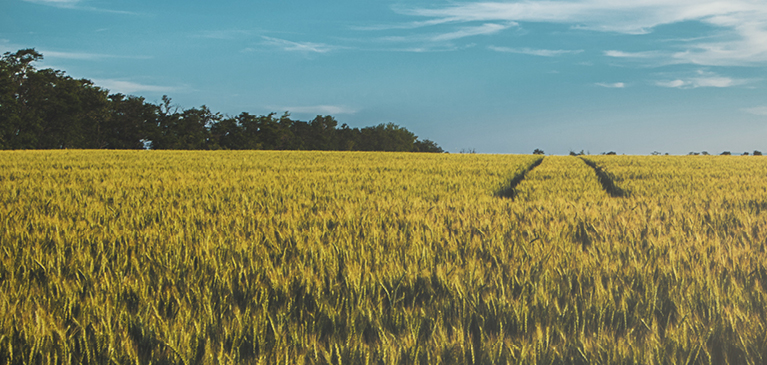
Laura and Russell Braun, owners of Golden Maple Farms, recently hosted the MAEAP Advisory Board on their farm. As a GreenStone member and director on GreenStone's board, Laura shares in this blog her thoughts on the importance of the program and GreenStone's engagement with it!
By: Laura Braun, GreenStone Director and owner of Golden Maple Farms
In this day in age, it is becoming more and more common for farmers to come under fire by those who may be misinformed or misunderstand modern agricultural practices. Populations that are further removed from the agricultural landscape combined with the rapid spread of information in the digital age provide fertile ground for the growth of this challenge. Sharing our story, and showcasing the positive work of our farms, is ever important!
Here at Golden Maple Farms, we have, over time, adopted more and more sustainable best practices that not only protect the land and water for which we are stewards, but are also financially sustainable. The Michigan Agriculture Environmental Assurance Program (MAEAP) verification was a logical next step in the management of our operation.
Practices that we were already implementing included regular soil testing, utilization of cover crops, and accurate record keeping. These steps make it easy to avoid purchasing and using too much fertilizer. Not only is this practice good for the environment, it is good for the check book. In today’s depressed farm economy – or any time – it is a good financial, as well as environmental, best practice. These steps, along with new ones identified in the verification process, are rewarded not only by recognition inside and out of our industry and community, but on our bottom line as well.
The process of becoming MAEAP verified was much simpler than we expected. Our MAEAP technician, Lindsey, met with us on several occasions to review the necessary steps toward verification and monitor progress. She was always available to answer any questions and was highly cognizant of any financial investment we might have to make in order to complete the process. In fact, other than one new fuel tank, our monetary investment was minimal. Lindsey kept the process on-task and made sure we made it through verification in a timely manner.
As a director at GreenStone, I am very supportive of the association’s role in supporting the MAEAP program and I would support continuing that involvement both by directly promoting it to our members and program sponsorship. GreenStone, as well as other agriculture support groups, plays an important role in the promotion and strength of the program. Personally, I am happy to know that anyone that drives past our farm will see and recognize the MAEAP sign and can be assured that our management practices are sustainable and environmentally sound.
We are happy to host the June meeting of the MAEAP Advisory Board and welcome them to Golden Maple Farms. It is our hope that our farm demonstrates to the Board and to other producers how the MAEAP program can be successfully implemented.
By: Laura Braun, GreenStone Director and owner of Golden Maple Farms
In this day in age, it is becoming more and more common for farmers to come under fire by those who may be misinformed or misunderstand modern agricultural practices. Populations that are further removed from the agricultural landscape combined with the rapid spread of information in the digital age provide fertile ground for the growth of this challenge. Sharing our story, and showcasing the positive work of our farms, is ever important!
Here at Golden Maple Farms, we have, over time, adopted more and more sustainable best practices that not only protect the land and water for which we are stewards, but are also financially sustainable. The Michigan Agriculture Environmental Assurance Program (MAEAP) verification was a logical next step in the management of our operation.
Practices that we were already implementing included regular soil testing, utilization of cover crops, and accurate record keeping. These steps make it easy to avoid purchasing and using too much fertilizer. Not only is this practice good for the environment, it is good for the check book. In today’s depressed farm economy – or any time – it is a good financial, as well as environmental, best practice. These steps, along with new ones identified in the verification process, are rewarded not only by recognition inside and out of our industry and community, but on our bottom line as well.
The process of becoming MAEAP verified was much simpler than we expected. Our MAEAP technician, Lindsey, met with us on several occasions to review the necessary steps toward verification and monitor progress. She was always available to answer any questions and was highly cognizant of any financial investment we might have to make in order to complete the process. In fact, other than one new fuel tank, our monetary investment was minimal. Lindsey kept the process on-task and made sure we made it through verification in a timely manner.
As a director at GreenStone, I am very supportive of the association’s role in supporting the MAEAP program and I would support continuing that involvement both by directly promoting it to our members and program sponsorship. GreenStone, as well as other agriculture support groups, plays an important role in the promotion and strength of the program. Personally, I am happy to know that anyone that drives past our farm will see and recognize the MAEAP sign and can be assured that our management practices are sustainable and environmentally sound.
We are happy to host the June meeting of the MAEAP Advisory Board and welcome them to Golden Maple Farms. It is our hope that our farm demonstrates to the Board and to other producers how the MAEAP program can be successfully implemented.


